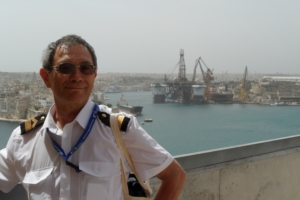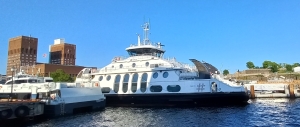Singapore is the leader of maritime cities in the world. Gdańsk in top 40

 By Marek Grzybowski
By Marek Grzybowski
Singapore, followed by Rotterdam, London, Shanghai and Oslo, are the leading maritime cities, according to research conducted by DNV and Menon Economics (“Leading Maritime Cities” report). Several new cities entered the top 50 this year: Shenzhen, Madrid, Gdansk, Jeddah and Naples, ranking 23rd, 29th, 39th, 43rd and 45th respectively. It is a success for Gdańsk to be included in such a prestigious group.
The study compared each maritime city based on five groups of factors: shipping centers, maritime finance and law, maritime technology, ports and logistics, and attractiveness and competitiveness. Within each group there were several significant indicators. In total, a complex of 45 parameters was taken into account.
For the purposes of the 2024 report, objective and subjective indicators have been improved, taking into account the latest key trends in the sector, such as the ecological transition. The new edition of the report uses more detailed data. This allowed for a more precise comparison of the relative performance for each city. Subjective indicators within each group are based on the perception and assessment of selected business directors – mainly shipowners and managers. Of the 190 experts invited to this study, approximately 37% are from Europe, 31% from Asia-Pacific, 26% from the Middle East, India and Africa, and the remaining 6% are from the Americas.


Singapore is the leader
According to the report’s authors, it is a city “unaffected by global conflicts and growing environmental changes in the industry. Singapore retained its position as the world’s leading maritime hub by ranking first in three of the five pillars.” The city continues to be a leader in terms of attractiveness and competitiveness. It regained the leading position in the shipping centers and ports and logistics categories. Singapore overtook Athens and Shanghai in these categories.
– A consistent innovation strategy and investments in the green transformation and digital technologies have enabled Singapore to regain its position. In the pillar of finance and maritime law, Singapore has climbed significantly, rising from 8th to 4th place, note the authors of “Leading Maritime Cities”.
There is one exception. Busan has overtaken Singapore to take the leading position in maritime technology, moving Singapore to 2nd place. Rotterdam and London continue to rank second and third respectively in the DNV and Menon Economics rankings.
Rotterdam scores high in most areas assessed. They stand out in the category of ports and logistics as well as attractiveness and competitiveness. In the area of finance and maritime law, Rotterdam ranks only 10th. London regained its No. 1 position in finance and maritime law, reversing New York’s position. In the overall ranking, Shanghai remained in fourth place. Oslo came in 5th place, moving two places lower than Tokyo, which was behind New York.


Dynamic changes in the top 30
After the top five, dynamic changes took place in the following positions. – Hong Kong, which was ranked 4th in 2019, has now dropped to 12th place. Athens also moved up significantly in the overall ranking and dropped out of the top 30, although it still ranks second in the nautical-friendly category.
We observe an interesting situation in the region including the Middle East. Despite the war, tensions and turmoil related to the crises around Israel, the Arabian Gulf and the Red Sea. The region’s leading cities have strengthened their position in the world ranking of maritime cities. Dubai improved its position in the general classification and moved from 13th to 11th place.
– The most impressive jump was made by Abu Dhabi, rising 10 places from position 32 to 22. This is the result of strategic public policy and consistent investments that have made the city a magnet for attracting talents and companies, the authors of the report emphasize and explain: “This, in turn, has a domino effect on the dynamics of the [maritime – MG] cluster, improving the long-term performance of the industry, which is reflected in good results on many indicators and the overall LMC ranking.


Urbanization “full speed ahead”
Other standout cities in the ranking include Osaka (up from 28th to 20th), Vancouver (up from 17th to 13th) and Barcelona (up from 34th to 27th). Several cities were in the top fifty this year. These include, among others, Gdańsk, taking 39th place.
Dr Shahrin Osman, director of business development at Maritime Consulting and co-author of the report, said: “Singapore is undoubtedly the world’s leading maritime industry leader. Many of the changes currently taking place in the sector appear to have no impact [on the city’s position – MoE] and it is expected to maintain its top position over the next five years thanks to the implementation of a coherent innovation strategy and investments in the green transformation and digital technologies. .
Urbanization is undoubtedly a trend that is particularly noticeable in coastal cities and metropolises. It is estimated that approximately 56% of the world’s population – 4.4 billion inhabitants – live in cities.
According to the World Bank, by 2050 the urban population will more than double its current population. It is assumed that two out of three inhabitants of our globe will live in cities. City dwellers are the main drivers of global economic growth. More than 80% of global GDP is generated in cities.
Some scientists predict that virtually all economic growth over the next 30 years will occur in urban regions. The report’s authors believe that “Companies are therefore increasingly focusing on urban regions when developing strategies to locate or expand their operations.” We also observe this in Poland, Pomerania and Gdańsk, which is in the top 40 of the world city ranking.
